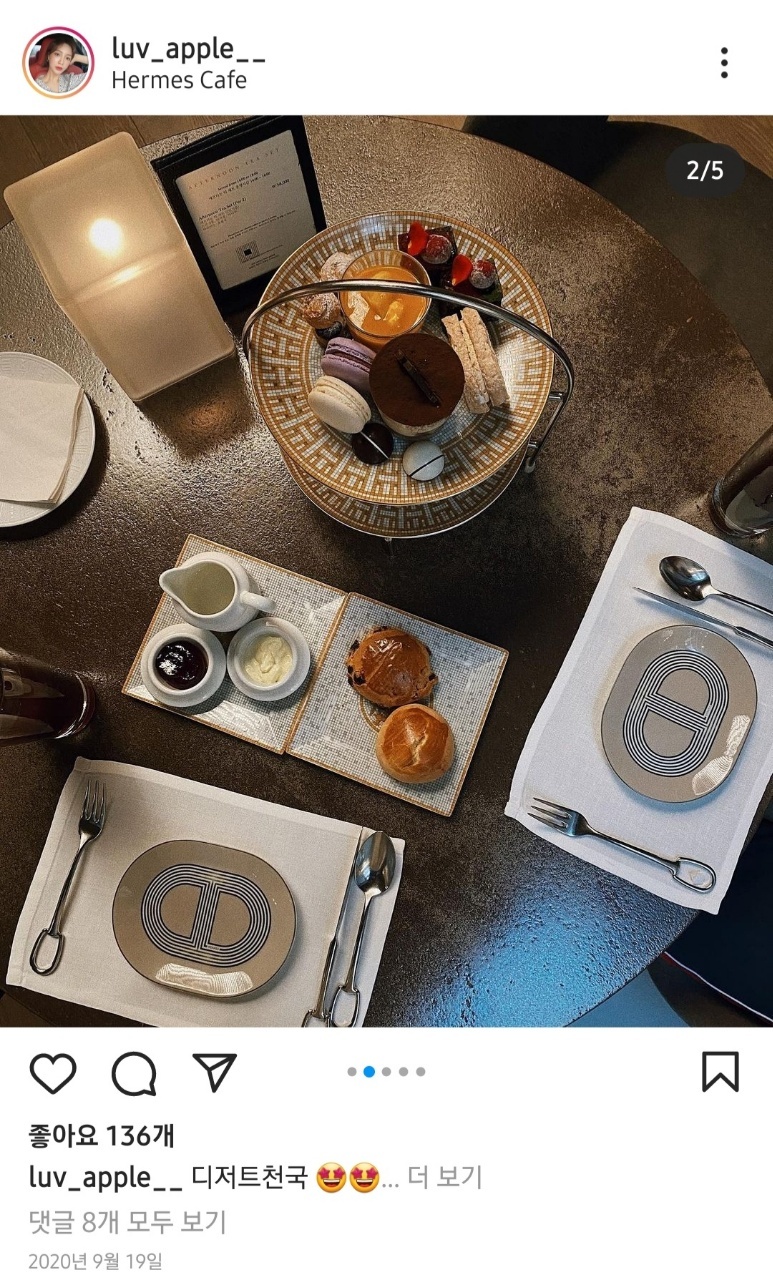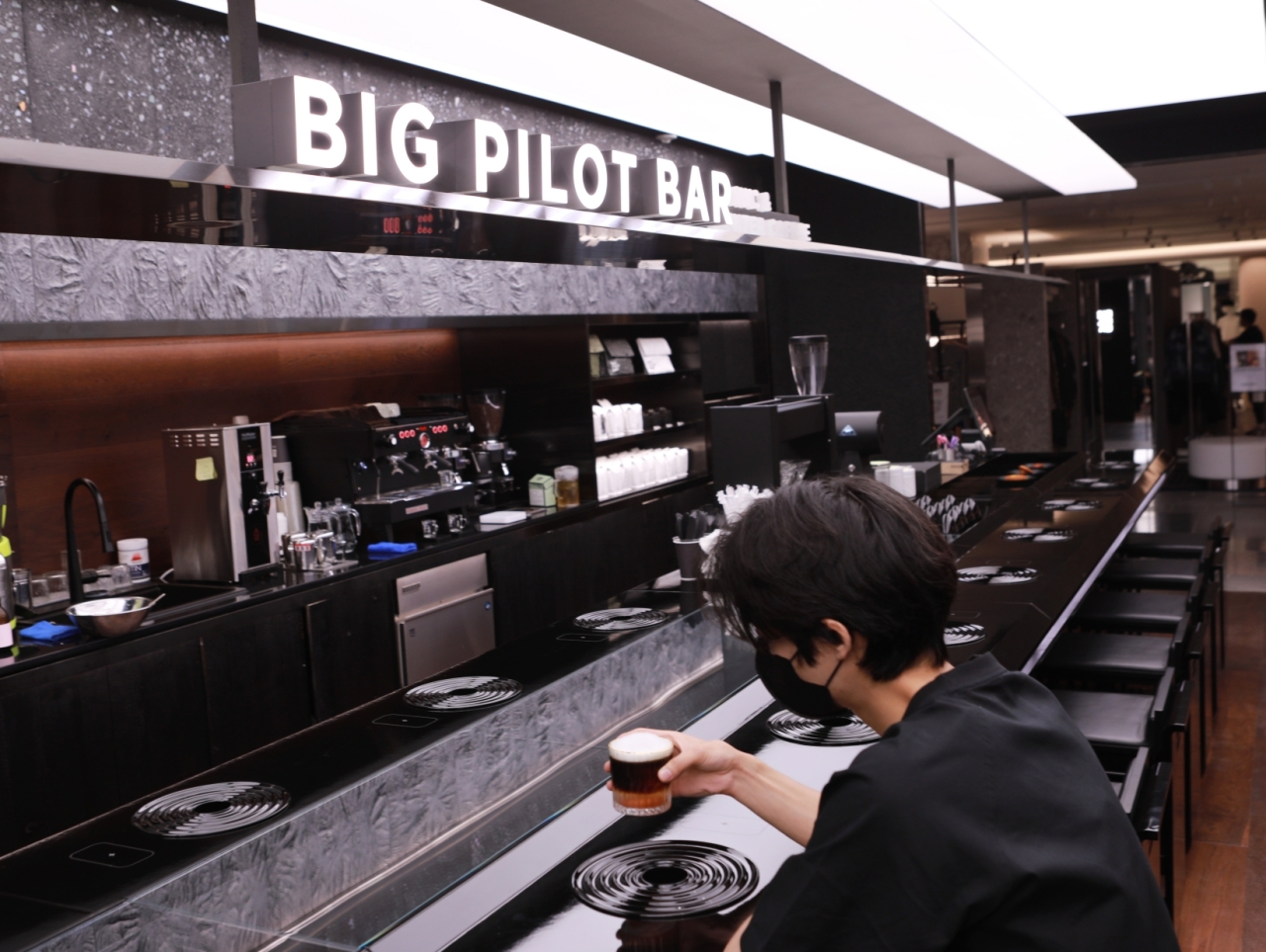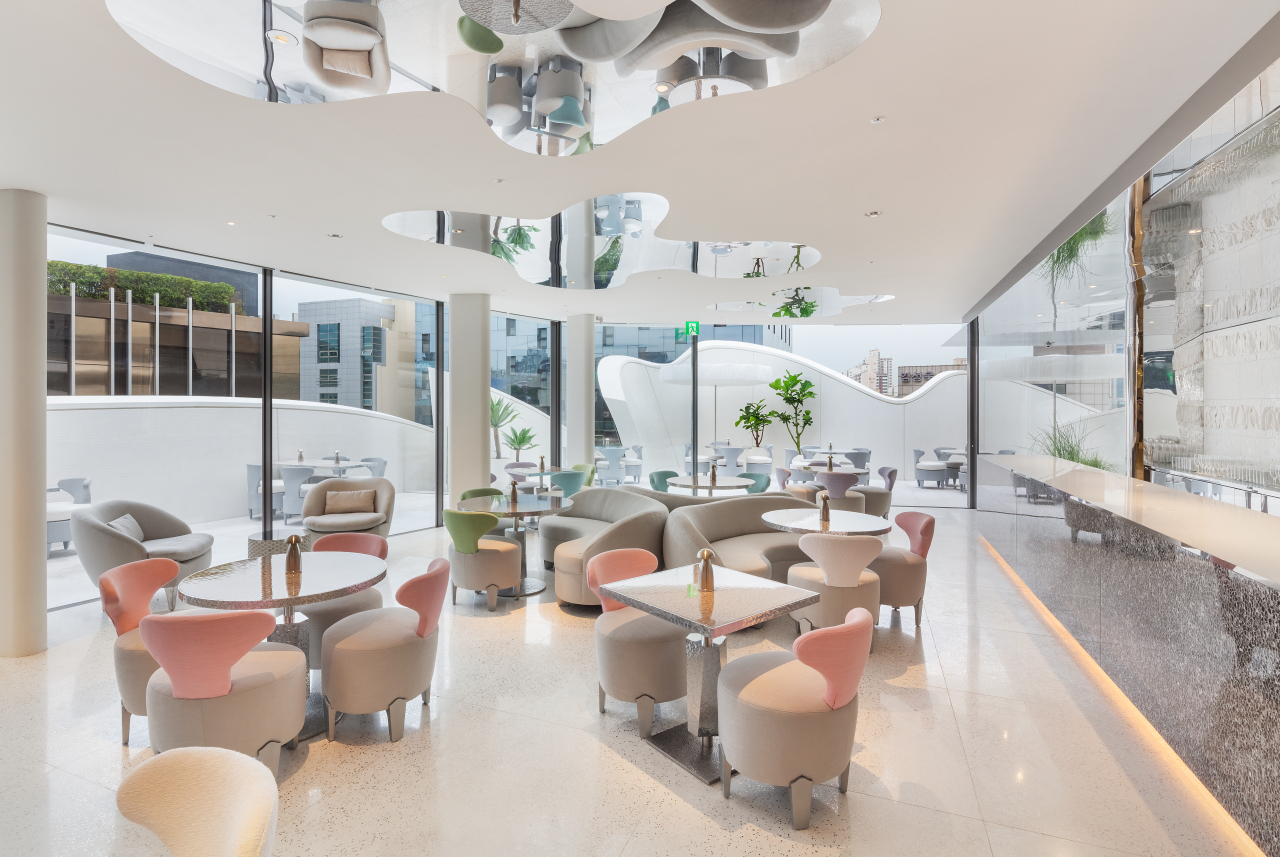 |
Instagram posts of photos take from the Hermes Cafe. (Kim Seon-young’s Instagram) |
Kim Seon-young has never owned anything by Hermes or Dior.
But, instead of bags or shoes, she has eaten food and drunk beverages from the luxury brands.
Her first taste of luxury was at the Hermes cafe, which she found through Instagram. She then went to the Cafe Dior in February and had a scoop of ice cream and drank iced coffee with her boyfriend.
Kim paid 70,000 won ($60) at Cafe Dior, but said it was definitely worth the price.
“I wanted to experience something special and feel how it’s like to be at a cafe of an international fashion brand like Dior. I am a big fan of Louis Vuitton and would love to visit the Louis Vuitton cafe in Japan too,” said Kim, who runs a cafe of her own in Ansan, Gyeonggi Province.
At age 31, Kim, is in the prime target market of the high-end fashion houses’ foray into the cafe business.
They may not yet have the money to own luxury goods from Hermes or Dior, but are emerging as the most important demographic in the brands’ efforts to shape the luxury retail.
In another move to appeal to the young consumers, IWC Schaffhausen, a maker of luxury Swiss watches, opened a coffee shop “The Big Pilot Bar” on July 11 in Lotte Department Store in Euljiro, central Seoul.
It’s the second food and beverage space in the world, after IWC’s cocktail bar in Geneva, Switzerland.
 |
A man drinks coffee at IWC’s The Big Pilot Bar in Lotte Department Store‘s Euljiro flagship branch. (Lotte Shopping) |
Lotte said it worked with the watchmaker for more than a year to create a space for men in their 20s and 30s, as it starts to see this demographic spend more time and money on luxury fashion floors.
“Shop managers told me there are a growing number of young customers that purchase IWC watches. A lot of male customers in their thirties come to ‘flex’ their money,” said Jeong Seon-hwa, a spokesperson for Lotte Department Store.
The trend has caught on to clothing brands too.
Vetements, a French streetwear brand worn by celebrities like Rihanna and G-Dragon, will launch a vegan burger set -- an assembly of a veggie burger, lemonade and fried potatoes packaged in neon-yellow wrappers bearing the “Vetements” logo -- in South Korea this fall.
“We are pleased to announce that ‘VETEMENTS BURGER’ will start a global expansion later this year with its first stop in South Korea,” the brand wrote on its official social media page.
Fashion brands expanding into other business areas is not new.
As trends change fast in fashion and often move on to food and then to housing and accommodation, many fashion brands have tried to diversify their business portfolios to protect themselves from short-term ups and downs in fashion and ensure a stable profit, experts say.
Some luxury brands have already launched their own hotels.
Bulgari, the 132-year old luxury fashion house, opened the “Bulgari Hotel” in Milan in 2004 and now operates hotels in five cities across the globe. Similarly, Giorgio Armani, famous for its high-end men’s wear, has Armani Hotels in Dubai and Milan, a luxury resort in Morocco and an exclusive beachfront residence in Egypt.
But the latest push for food and drinks is more of an investment for the future, rather than a portfolio diversification, says Lee Soo-jin, an associate professor at Dongduk Women’s University department of Fashion Design.
“There’s no future for a brand if they lose the MZ generation. They are a different breed of people,” Lee said, referring to Millennials and Generation Z, born between 1980 and 1995.
“Their spending habits foreshow what the next generation of customers will be like,” the professor said. “Right now, luxury fashion brands are trying everything they can to absorb this demographic. They want to look approachable and are keeping up to date with MZ trends. Companies are preparing for the future.”
According to global consulting firm Mickensy & Company, the MZ generations are after “experiential luxury” and “Instagrammable moments,” rather than the luxury items themselves.
And that is precisely what the luxury cafes appear to be offering.
 |
Cafe Dior located on the fifth floor of Dior’s flagship boutique in Cheongdam-dong, southern Seoul (Dior Korea) |
Cafe Dior, located on the fifth floor of Dior’s flagship boutique in Cheongdam-dong, Seoul, serves a glass of iced coffee at 19,000 won, pretty expensive compared to other cafes. Starbucks’ Iced Caffe Americano is sold at 4,100 won in Korea.
“Obviously you go there to take photos and brag about it with your Instagram friends,” said Oh Dong-chul, 28, who went there in March.
“It’s not a regular cafe. The number of people visiting my feed almost doubled after I posted a photo of me drinking coffee there (on Instagram). I’d pay 50,000 won to spend time at the Dior cafe instead of buying a 500,000 won Dior scarf,” he said.
As a testament to its popularity, there are close to 20,000 posts with the hashtag “DiorCafe” in Korean circulating on Instagram.
Experts also note that this trend will continue, especially in the wake of the pandemic. Young people have witnessed death and illnesses from the coronavirus and that has permanently changed how they view spending.
“The COVID-19 pandemic has got young people into thinking they should ‘spend while they are alive (instead of saving money),’” said Seo Yong-koo, a marketing professor at Sookmyung Women’s University.
“The MZ generations are the richest kids in Korea’s entire history. They have the strongest preference and knowledge of luxury brands. So-called ‘flexing’ culture, buying expensive stuff to boast about, is part of their DNA. We will see more MZ customers pursuing the ‘high-end’ life style instead of the products itself.”
By Kang Jae-eun (
kang.jaeeun@heraldcorp.com)










